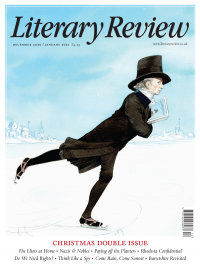David Anderson
The Spy Who Taught Me
Behind the Enigma: The Authorised History of GCHQ, Britain’s Secret Cyber-Intelligence Agency
By John Ferris
Bloomsbury 848pp £30
How Spies Think: Ten Lessons in Intelligence
By David Omand
Viking 352pp £20
British officialdom was not always attracted to eavesdropping. Viscount Falkland, Charles I’s secretary of state at the start of the Civil War, thought the opening of the letters of the king’s enemies ‘such a violation of the law of nature that no qualification by office could justify a single person in the trespass’ (though, as his friend the Earl of Clarendon recorded, he ‘found means to shift it from himself’). In the late Victorian period, secret intelligence was collected only for specific purposes, usually concerned with imperial security; the messages of the great European powers were neither intercepted nor decrypted.
All that changed irreversibly with the approach of the First World War and the birth of modern signals intelligence (sigint), the result of what the Canadian academic John Ferris describes in his official history of GCHQ as ‘a collision between electronics, radio, data processing and cryptology’. The interception and decoding of the Zimmermann telegram, a German offer of a military alliance to Mexico that promised the restoration of territory annexed by the United States, helped unify American opinion in favour of entering the war. By 1918 British sigint employed 9,500 people, ran around a hundred intercept stations and had developed techniques – notably traffic analysis (assessment not of the content of communications but of their patterns and external features) – that remain central to intelligence work today in fields ranging from counterterrorism to cyber-defence.
Founded in 1919 as the Government Code and Cypher School, GCHQ is the largest of the UK’s secret intelligence agencies and the major collector of foreign intelligence. Functioning symbiotically with the US National Security Agency (NSA), it is at the heart of an intelligence relationship unique in the world. Through

Sign Up to our newsletter
Receive free articles, highlights from the archive, news, details of prizes, and much more.@Lit_Review
Follow Literary Review on Twitter
Twitter Feed
Russia’s recent efforts to destabilise the Baltic states have increased enthusiasm for the EU in these places. With Euroscepticism growing in countries like France and Germany, @owenmatth wonders whether Europe’s salvation will come from its periphery.
Owen Matthews - Sea of Troubles
Owen Matthews: Sea of Troubles - Baltic: The Future of Europe by Oliver Moody
literaryreview.co.uk
Many laptop workers will find Vincenzo Latronico’s PERFECTION sends shivers of uncomfortable recognition down their spine. I wrote about why for @Lit_Review
https://literaryreview.co.uk/hashtag-living
An insightful review by @DanielB89913888 of In Covid’s Wake (Macedo & Lee, @PrincetonUPress).
Paraphrasing: left-leaning authors critique the Covid response using right-wing arguments. A fascinating read.
via @Lit_Review